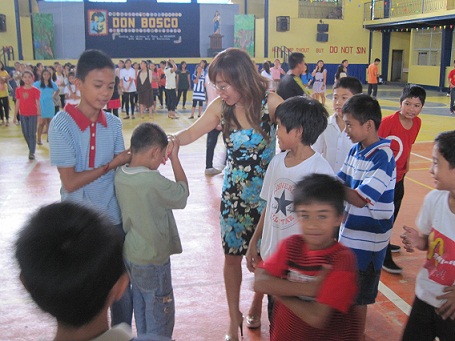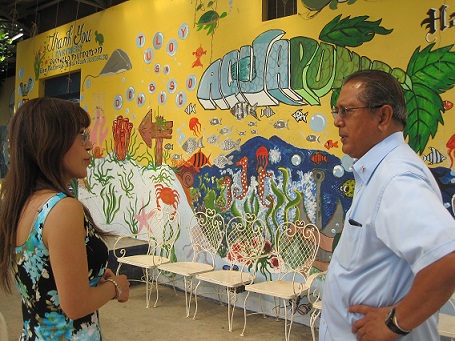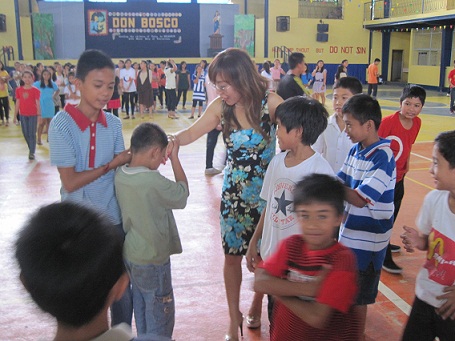 Text and photos by ELIZABETH LOLARGA
Text and photos by ELIZABETH LOLARGA
BEFORE she could even sing one note in tonight’s much-awaited concert, operatic sensation and Grammy award-winning crossover artist Sumi Jo already promised over 200 children and teenagers saved from the mean streets that she would return to the Philippines to be with them.
During her visit yesterday to Tuloy sa Don Bosco Streetchildren Village on Alabang-Zapote Road, Muntinlupa City, to turn over a donation and her music CDs to Tuloy Foundation Inc., she watched a short musical program in the gym. She swayed from her seat and applauded appreciatively.
She addressed the children with her lilting “Hello, angels!” They sang and mimed a welcome song, David Pomeranz’s “In Your Hands,” but when they got to “You Raise Me Up,” an inspirational song popularized by John Groban, she rose spontaneously and finished the chorus with them. Technically speaking, that was her Manila debut.
Rocky Evangelista, SDB, the foundation’s president and founder caught her offguard when he asked if she could sing at least one song for the children in return. She quickly asked if the Groban recording could be replayed while she hastily googled the lyrics on her cell phone, then asked the community to sing with her, her voice rising as she gained more confidence with the lyrics. Then she put down the phone and rose to join the kids again in a sing-sway dance for the chorus.
The gesture wasn’t lost on the youth, their teachers and Evangelista. Earlier, he told Jo, a Roman Catholic, how her visit was timely. The foundation was raising its standard of excellence by opening a school of the arts to enable naturally gifted students to realize their potentials in singing, dance, drama.
 The children were orphaned, abandoned, exploited for labor, found in the streets trafficked or mired in drugs. Their ages range from nine to 17. The foundation put the ceiling for the youngest at nine because at that age, children could already answer two questions honestly. The first is, if they are poor, do they want to do something about their lives? The second is, are they willing to follow the rules? Based on their answers, they could decide for themselves if they want in or remain where they are.
The children were orphaned, abandoned, exploited for labor, found in the streets trafficked or mired in drugs. Their ages range from nine to 17. The foundation put the ceiling for the youngest at nine because at that age, children could already answer two questions honestly. The first is, if they are poor, do they want to do something about their lives? The second is, are they willing to follow the rules? Based on their answers, they could decide for themselves if they want in or remain where they are.
Evangelista said even if the children are poor (not having had food, clothes, shelter and an education at some point in their lives), they are taught not to look at themselves as poor.
He said, “We have a whole philosophy–if you want to help a poor child, you must raise his or her dignity by giving the best, by raising the standard of excellence. Build the whole person by putting in the arts. The arts lets the child grow into an integrated being. Just give them a chance, give them all the possibilities so they can stand on their own.”
The multi-building village that grew little by little on a four-hectare former garbage dump now houses and schools 211 kids. The food is grown from fish raised and vegetables grown the hydroponic way.
Evangelista said the number of children swell to 700-plus, but the others have little homes to go to on school days. The school offers vocational courses to older kids like dressmaking, computer technology and repair, bar tending, among others.
The “transients” were another group of children present at the gym. They go to Tuloy for catechism, for football training or just to play. The nuns there call them from the streets and invite them to play in the village to keep them off the streets and improve their behavior.
Evangelista, with whom Jo had an animated conversation in Italian, toured her and her party. She said, “I love it! It’s beautiful.”
After his introduction of her to the children, she responded simply, “Hello, angels. I’m a singer. I travel around the world to sing. I’m a UNESCO activist for peace. For me peace and the children are the most important things in this world.”
Then she asked, “Can you wait for me to come back?” When they cheered her, she promised she would return to the Philippines to sing again.
Jo thanked Evangelista for the opportunity to visit because she intends to “let other people know of this.”
Much later, as she walked to her hotel to pick up her music sheets, Jo paused by the entrance, bent on her knees and gently petted the head of a black dog, a part of the security unit.





